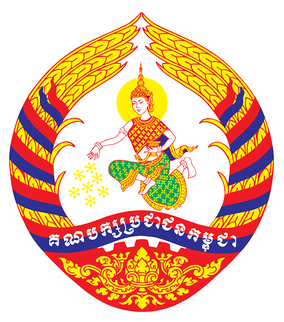Cambodian People's Party: Difference between revisions
imported>Oscargerardo No edit summary |
Rangerkid51 (talk | contribs) No edit summary |
||
| (2 intermediate revisions by the same user not shown) | |||
| Line 1: | Line 1: | ||
{{Evil Organization | {{Evil Organization | ||
|Box title = Evil Organization | |Box title = Evil Organization | ||
|Image = | |Image = Cambodian People's Party (emblem).png | ||
|size = | |size = | ||
|fullname = Cambodian People's Party | |fullname = Cambodian People's Party | ||
| Line 69: | Line 69: | ||
[[Category:Anti-Christian]] | [[Category:Anti-Christian]] | ||
[[Category:Anti-Catholic]] | [[Category:Anti-Catholic]] | ||
[[Category:Anti- | [[Category:Anti-Semitic]] | ||
[[Category:Islamophobes]] | [[Category:Islamophobes]] | ||
[[Category:Cambodia]] | [[Category:Cambodia]] | ||
[[Category:Countries]] | [[Category:Countries]] | ||
Latest revision as of 23:40, 6 January 2025
|
The Cambodian People's Party (CPP; Khmer: គណបក្សប្រជាជនកម្ពុជា, Kanakpak Pracheachon Kâmpuchéa; French: Parti du peuple cambodgien, PPC) has been the ruling political party of Cambodia since 1979. Founded in 1951, it was originally known as the Kampuchean People's Revolutionary Party (Khmer: គណបក្សប្រជាជនបដិវត្តន៍កម្ពុជា, KPRP). The party is currently lead by Cambodian Prime Minister Hun Sen.
History edit
The original Kampuchean People's Revolutionary Party (KPRP) was founded on 28 June 1951 by Cambodian nationalists who struggled to free Cambodia from French colonial rule. Nationalists in Cambodia, Vietnam and Laos shared the same belief that to free themselves from France successfully they needed to work together. Thus the Indochinese Communist Party was founded by Ho Chi Minh in 1930.
However, the triumph of the Japanese during the early stage of World War II crippled French rule and helped to nurture nationalism in all three Indochinese countries. Consequently, the idea of an Indochinese-wide party was submerged in the rhetoric of fierce nationalism. In Cambodia, growing nationalist sentiment and national pride married historical mistrust and fear of neighbouring countries, which turned out to be a stumbling block for the ICP.
In 1955, a subsidiary party named People’s Party was established to contest in the national election that year. The name of the party was changed to the Workers' Party of Kampuchea (WPK) on 28 September 1960 and then to the Communist Party of Kampuchea (CPK, whose followers were named as the Khmer Rouge by Prince Norodom Sihanouk) in September 1966 with its headquarter in Ratanak Kiri province.
After toppling the Khmer Rouge regime with the Vietnamese-backed liberation of Phnom Penh, it became the ruling party of the People's Republic of Kampuchea (1979–1989), which was later renamed the State of Cambodia (1989–1991). The current name, CPP, was adopted during the final year of the State of Cambodia, when the one-party system as well as the Marxist–Leninist ideology were abandoned.
Originally rooted in communism and Marxist–Leninist ideologies, the party took on a more reformist outlook in the mid-1980s under Heng Samrin. In 1991, the CPP officially dropped its commitment to socialist ideology, and has embraced a free market economy.
The CCP is considered to be one of the most corrupt political parties in the world. After a series of flagrant violation against basic human rights a feeling of incertitude regarding the direction the country is emerging, sometimes comparing the situation to a newborn Burma.
In its report on Cambodia, Human Rights Watch stated that "Authorities continue to ban or disperse most public demonstrations. Politicians and journalists critical of the government face violence and intimidation and are barred from equal access to the broadcast media. In addition, the judiciary remains weak and subject to political influence. Trafficking of women and children for sexual exploitation through networks protected or backed by police or government officials is rampant. The government continues to turn a blind eye to fraudulent confiscation of farmers’ land, illegal logging, and widespread plundering of natural resources.”
The current state of the country could be described as a semblance of pluralistic democracy. In July 2004, the royalist opposition party FUNCINPEC formed a coalition government with the CPP after a political deadlock of more than a year. More recently, Sam Rainsy Party (SRP) members have been targeted for criminal prosecutions, after seeing the parliamentarian immunity of several SRP members lifted by a criticized closed-door hand vote with members of the parliament.
Other serious and persistent human rights problems include unresolved political murder, abuse of unionists and opposition politicians. Amongst several unresolved assassinations, the murder of union leader Chea Vichea received strong international coverage by major human rights and labour organizations, and the United Nations.
Land confiscations, arbitrary arrest and detention, torture, forced child labor, trafficking in women and children, discrimination and domestic violence against women, and abuse of children are also affecting Cambodians.
The CPP also protected surviving members of the Khmer Rouge regime from being prosecuted for their crimes for a number of years, all the way into the 2000's. Most of them under the party's protection - particularly Nuon Chea, Ieng Sary, Khieu Samphan, and Kang Kek Iew - wouldn't face trial until 2014.
